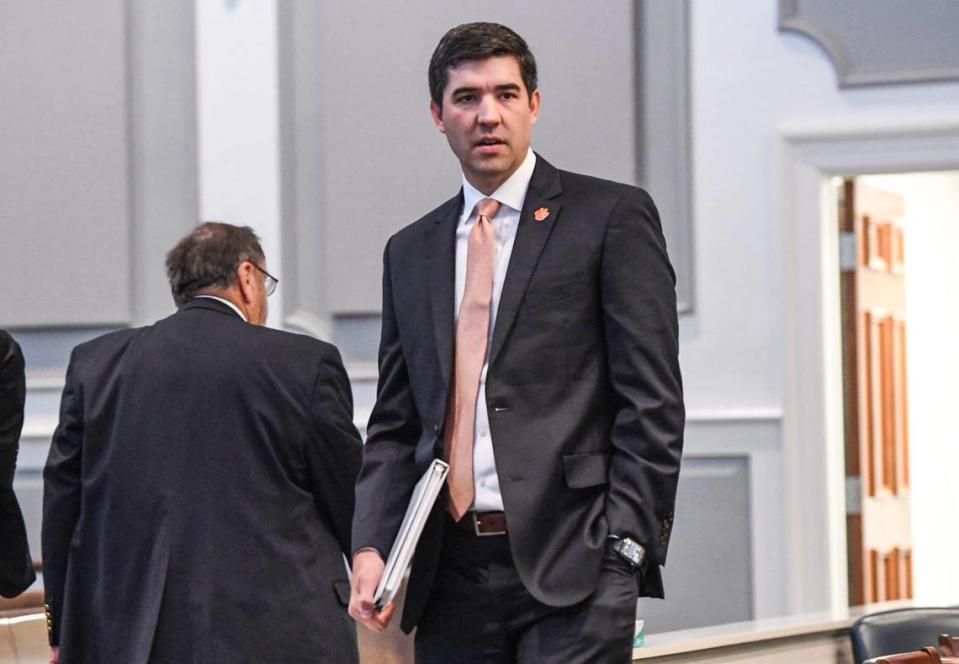Clemson athletic director Graham Neff addresses ACC lawsuit, conference realignment
Five months after Clemson filed a lawsuit against the ACC in an initial step to position itself to leave for another conference, Tigers athletic director Graham Neff said he’s still telling the school’s coaches, athletes and staffers the same thing.
“We’re going to be great members of the conference we’re in.”
To Neff, Clemson’s AD, that means acting “incredibly professional” and going about day-to-day business with the understanding that while the university and the conference are engaged in an expensive, lengthy and tense legal battle over the ACC’s grant of rights and exit fee, things outside the courtroom can be different.
“That’s been a message point of mine that I have been and will remain consistent on,” Neff said Wednesday during a wide-ranging news conference ahead of a new athletic year for the Tigers’ No. 14 football team and other sports.
In his first media availability since Clemson sued the ACC on March 19 in South Carolina court and the ACC countersued Clemson in North Carolina the following day, Neff declined to comment on the specifics of the court battle, saying he’d let the legal process play out.
But a month after ACC commissioner Jim Phillips insisted his conference would fight active lawsuits from Clemson and Florida State “as long as it takes,” Neff struck a similar tone.
“We’re going to do what’s best for Clemson,” he said.
Neff, approaching his three-year anniversary as Clemson athletic director after replacing now-Miami AD Dan Radakovich in fall 2021, has had a front-row seat to the Clemson-ACC court battle, which comes amid a growing revenue gap between power conference schools.
The dispute centers around the enforceability of the conference’s grant of rights, a document that currently binds the media rights revenue generated from ACC schools’ home games (the key games there being football) through 2036 as part of an agreement with ESPN – even if a school were to depart for another conference in that time period.
Clemson signed that document in 2013 and 2016. But as the Big Ten and SEC expanded and signed more advantageous TV deals that could eventually give their member schools an extra $30 to $40 million per year in conference payouts, the Tigers – a charter member of the ACC dating back to 1953 – took the historic and dramatic step of suing its own conference.

Clemson (one of the league’s most valuable football brands) is challenging the enforceability of the ACC grant of rights as well as its $140 million exit fee required of any school leaving. The total cost of leaving the ACC, between that exit fee as well as forfeited media rights through 2036, has been ballparked at over $500 million by FSU, which is also suing the league.
Neff said on Wednesday that he, Clemson president Jim Clements and the university’s board of trustees “couldn’t be more aligned” in their shared mission of making sure the school’s athletic department and sports programs are in a strong position in a changing landscape.
Phillips, the ACC commissioner, made sure to mention during a passionate news conference at ACC kickoff that while he’s intent on fighting Clemson and FSU lawsuits he considers “damaging” and “harmful,” he’s still committed to working with the schools as members.
Neff said he appreciated Phillips’ comments on “the professional nature of the relationships and what his role is, what athletic directors’ roles are, my role is. We’re going to continue to act. I couldn’t have felt more supported from his chair in the day-to-day and, certainly, with my (AD) colleagues around the ACC table.”
“And I’ve been real consistent with our staff and our coaches and our student-athletes about the expectations for us to be great members of the conference we’re in,” Neff said, adding that he was excited about the ACC “success initiative” that goes into effect this fall and will give extra revenue to schools to exceed in top money-making sports such as football.

Neff – who’s been a consistent presence at hearings for the Clemson vs. ACC lawsuit in South Carolina and the separate ACC vs. Clemson lawsuit in North Carolina – declined to comment specifically on Clemson’s legal strategy after a newsy summer on the court front.
The university tried to have the ACC’s countersuit in North Carolina thrown out, but a judge denied that request on July 10. Clemson is appealing that decision to the North Carolina Supreme Court, a process that could take 12 to 18 months, per one university lawyer.
On July 12, a South Carolina judge also ruled the original case filed in Pickens County could also continue, which was viewed as a favorable legal ruling for the Tigers and positions the two cases to run parallel for the time being.
Neff, though, did say the national landscape surrounding college athletics realignment has “never been more active” and, as part of his job, he’s monitoring that on a daily basis.
Over the past three years, various national reporters have connected Clemson to the SEC and the Big Ten as a potential expansion candidate; as that buzz slowed down this summer, a new wave of reports said Clemson and FSU had been in exploratory conversations with Big 12, whose commissioner, Brett Yormark, has been aggressive on the expansion front. (Nothing’s changed, and Clemson remains an ACC member.)
“There’s plenty written,” Neff said. “All the speculation, right? And I read a lot of it – I don’t read all of it. But it’s part of my job to be very engaged in what’s written, but more, really, where a lot of the moving parts and maybe conversations are nationally. And so we do that.”
Fair to say that whatever Clemson winds up doing realignment-wise, all of that is on hold until the university and the ACC get a formal resolution in their court battle?
“I’ll pass on the legal sequencing of that only to say that we’re going to continue to have our legal team work the legal process with it, act incredibly professional, be great members of the conference we’re in and be really well read and connected nationally with all of the moving parts,” Neff said.

 Yahoo Sports
Yahoo Sports 
